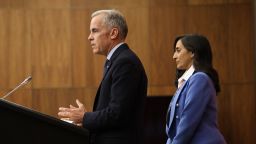Science
Western Powers Amplify Calls for Palestinian Statehood

Growing international support for a Palestinian state is intensifying, with major Western nations like France, the United Kingdom, and Canada lending their voices to the cause. This surge of backing follows the endorsement of Palestinian statehood by over 140 countries. While the motivations for these calls vary—from frustration with Israel to humanitarian concerns regarding the plight of Palestinians—such actions have been warmly received by Palestinian leaders as a significant boost to their aspirations.
The Israeli government has firmly opposed these developments, labeling them as a reward for terrorism. Tensions have escalated further with US President Donald Trump, who has expressed growing frustration towards Israeli Prime Minister Benjamin Netanyahu over the humanitarian crisis in Gaza. This situation has drawn international attention, with Trump advocating for regional peace and the potential recognition of his efforts through a Nobel Peace Prize.
Saudi Arabia’s stance remains clear: normalization of relations with Israel is contingent upon a credible pathway to Palestinian statehood. The recent declarations from France, the UK, and Canada have left the United States increasingly isolated in its support for Israel. The ongoing conflict has claimed the lives of over 60,000 Palestinians in Gaza since the brutal attack by Hamas on October 7, 2023, which resulted in approximately 1,200 deaths in Israel.
Historical Context and Challenges
Envisioning a viable Palestinian state presents numerous challenges, particularly given that such a state has never existed in modern history. The establishment of Israel in the aftermath of World War II is remembered by Palestinians as al-Naqba, or “the catastrophe,” marking the displacement of hundreds of thousands of people from their homes. The Israeli territories expanded significantly during the Six-Day War in 1967, resulting in the acquisition of East Jerusalem, the West Bank, and Gaza, while Palestinian territories have continued to shrink.
The most concrete framework for a potential Palestinian state emerged from the Oslo Accords in the 1990s, which proposed a future state based on Israel’s 1967 borders, incorporating land swaps to accommodate both parties. The historic handshake between then Israeli Prime Minister Yitzhak Rabin and Palestinian leader Yasser Arafat, facilitated by then-US President Bill Clinton, symbolized a hopeful moment in the peace process. However, Rabin’s assassination in 1995 by a far-right extremist dealt a severe blow to these peace efforts.
Today, the prospects for a Palestinian state remain tenuous. The expansion of Israeli settlements in the occupied West Bank has accelerated, often with government support, complicating the feasibility of a contiguous Palestinian state. Additionally, governance issues further complicate the situation, as many Palestinians express distrust towards the Palestinian Authority, viewing it as ineffective and corrupt.
Political Implications and Future Prospects
Netanyahu’s government has shown no willingness to accept a Palestinian state, claiming it would serve as a “launch pad to annihilate Israel.” Some members of his cabinet advocate for annexation of Palestinian territories and have made alarming statements regarding the treatment of Palestinians in Gaza. Their hardline stance could destabilize any potential negotiations, as they threaten to withdraw support from Netanyahu if he concedes to international pressure.
The current political landscape presents a challenging paradox. While international calls for Palestinian statehood grow louder, without a cooperative partner in the Israeli government, these efforts may yield little progress. Should Netanyahu maintain his hardline approach, the prospect of Palestinian statehood could become even more elusive.
As the international community continues to apply pressure for a resolution, Israel may find itself at a disadvantage. The evolving dynamics suggest that the future of both Palestinian aspirations and Israeli security hinges on the ability of leaders on both sides to engage constructively.
-

 Technology5 months ago
Technology5 months agoDiscover the Top 10 Calorie Counting Apps of 2025
-

 Health3 months ago
Health3 months agoBella Hadid Shares Health Update After Treatment for Lyme Disease
-

 Health3 months ago
Health3 months agoErin Bates Shares Recovery Update Following Sepsis Complications
-

 Technology4 months ago
Technology4 months agoDiscover How to Reverse Image Search Using ChatGPT Effortlessly
-

 Technology1 month ago
Technology1 month agoDiscover 2025’s Top GPUs for Exceptional 4K Gaming Performance
-

 Technology3 months ago
Technology3 months agoElectric Moto Influencer Surronster Arrested in Tijuana
-

 Technology5 months ago
Technology5 months agoMeta Initiates $60B AI Data Center Expansion, Starting in Ohio
-

 Technology5 months ago
Technology5 months agoRecovering a Suspended TikTok Account: A Step-by-Step Guide
-

 Health4 months ago
Health4 months agoTested: Rab Firewall Mountain Jacket Survives Harsh Conditions
-

 Lifestyle5 months ago
Lifestyle5 months agoBelton Family Reunites After Daughter Survives Hill Country Floods
-

 Health3 months ago
Health3 months agoAnalysts Project Stronger Growth for Apple’s iPhone 17 Lineup
-

 Technology4 months ago
Technology4 months agoHarmonic Launches AI Chatbot App to Transform Mathematical Reasoning





















